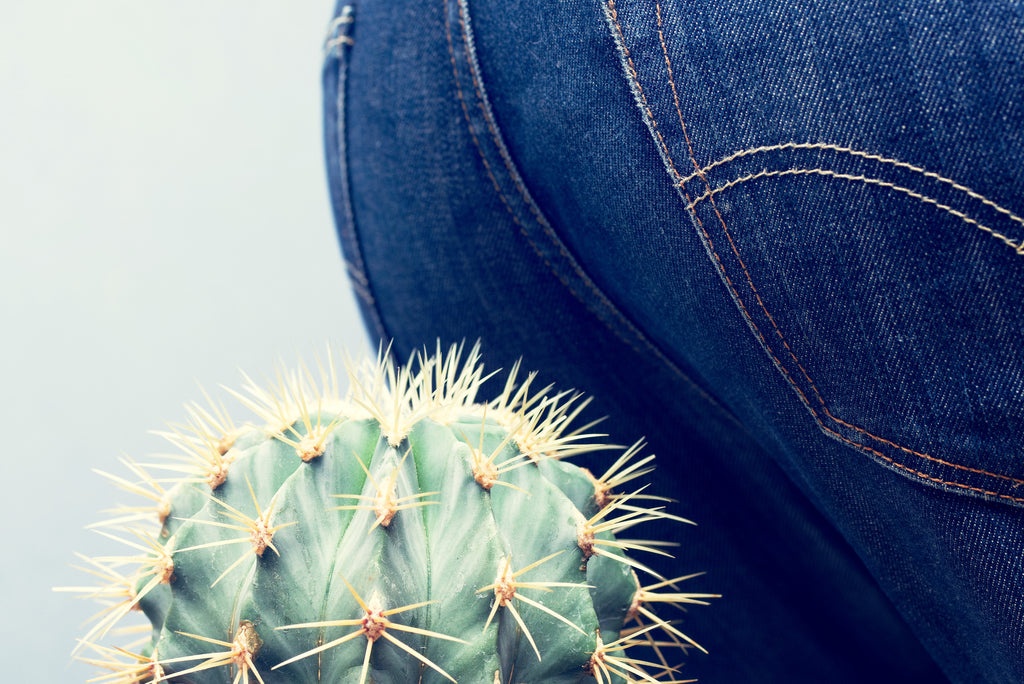Are your hemorrhoids hurting? Hemorrhoids come with many unpleasant and irritating symptoms. Symptoms vary from patient to patient and based on what type of hemorrhoid you have.
One of the most common questions patients ask about hemorrhoids is: do hemorrhoids hurt?
The answer depends on the type of hemorrhoid you have and how bad it is. Let’s explore the topic of hemorrhoids further to answer this common question.
What Are Hemorrhoids?
Hemorrhoids are swollen veins in the lowest part of your rectum and anus. Some hemorrhoids cannot be seen or felt while others present as lumps or cushions around the opening of the anus.
When the walls of these swollen veins stretch, the veins become irritated and bulge, causing hemorrhoids.
Hemorrhoids fall into two general categories: internal and external hemorrhoids. Internal hemorrhoids are located inside the rectal area of the anus and cannot be seen or felt.
These types of hemorrhoids are generally painless because they are located in an area of the anus that is void of pain-sensing nerves.
Sometimes bleeding is the only sign of internal hemorrhoids and sometimes they present with no signs or symptoms at all.
While most internal hemorrhoids go away on their own without the need for treatment, some internal hemorrhoids may get worse as time goes on.
As internal hemorrhoids get worse, they can become prolapsed.
This means they get big enough that they bulge outside the anal sphincter. When internal hemorrhoids become prolapsed, they are more likely to hurt. They can become especially painful before and after bowel movements.
External hemorrhoids are the type of hemorrhoids that are often associated with pain. They are found under the skin around the anus.
They occur in an area at the opening of the anus that is filled with pain-sensing nerves. In more severe cases, external hemorrhoids can become thrombosed. This is the most painful type of hemorrhoid.
Thrombosis occurs when a blood clot forms in an external hemorrhoid and causes it to turn purple or blue, itch, and bleed.
Why Do Hemorrhoids Hurt?
Harvard Health reports that hemorrhoids can be a recurrent and painful intrusions. While internal hemorrhoids are often associated with little to no symptoms, external hemorrhoids are frequently reported to be accompanied by pain.
According to Colorectal Surgeon and the Chief of Surgery at Mercy Suburban Hopsital in East Norriton, PA, Christopher J. Bruce, M.D., external hemorrhoids have a rich nerve supply.
It is the rich pain-sensing nerve presence that causes the painful swelling associated with hemorrhoids.
Internal hemorrhoids that become prolapsed protrude out of the anus. Prolapsed hemorrhoids are considered stage IV internal hemorrhoids.
Prolapsed hemorrhoids can become strangulated or turn into blood clots known as thrombosis. The inflammation of prolapsed hemorrhoids causes added pressure on the anal area which causes these hemorrhoids to hurt.
When a hemorrhoid becomes strangulated, the blood supply is blocked and can cause pain in the anal sphincter.
How do I Treat Hemorrhoids that Hurt?
When your hemorrhoids are associated with pain, there are several ways you can treat these bothersome symptoms.
Treatment of hemorrhoids that hurt depends on what type of hemorrhoid you are dealing with.
Here are the most common ways to treat the pain associated with hemorrhoids:
- Many prolapsed hemorrhoids will reduce on their own. In more serious cases, if they do not spontaneously reduce, you will need to seek medical treatment for prescription medication or non-invasive procedures. Before you seek medical treatment, many patients are successful with at-home treatment. Prolapsed hemorrhoids can be treated through self-care options. These include:
- The use of ice packs
- Sitz baths
- Over-the-counter wipes, creams, and ointments
- Avoidance of straining during bowel movements
- High-fiber diets
- The use of fiber supplements
- Proper hydration
-
Thrombosed hemorrhoids are commonly treated with a procedure called a thrombectomy. This procedure is done by a surgeon who makes a small incision in the hemorrhoid to drain the blood. If this procedure is not done a few days after the blood clots develop, other treatment may be needed. Surgery to treat thrombosed hemorrhoids include:
- Hemorrhoidectomy- a surgery to remove the hemorrhoids, blood vessels, and clot. This is done under general anesthesia. It is the most invasive surgery and is done in severe cases.
- Rubber band ligation- This procedure involves the placing of an elastic band around the base of the hemorrhoid. This cuts the blood supply to the hemorrhoid and causes it to shrink over time.
- Stapling- this procedure involves the placing of a surgical staple into the hemorrhoid to cut blood supply. It is also done under general anesthesia.
-
External hemorrhoids can be treated in a number of ways. Since these are the most common type of hemorrhoid reported by patients, and they are commonly associated with pain, different patients may respond to different treatments better than others. The most common ways to treat external hemorrhoids are:
- Sitz baths to soak the affected are in warm water to reduce inflammation and heal anal tissue.
- Application of ice packs or cold compresses to reduce pain and inflammation.
- Over-the-counter hemorrhoid creams and ointments to relieve common symptoms and allow the hemorrhoids to heal.
- Pain relievers to reduce pain.
- Stool softeners to reduce irritation and allow stool to pass more easily.
- Hemorrhoids wipes or the application of witch hazel to reducing irritation, itching, and pain.
- Lifestyle changes such as eating a more fiber-rich diet, increased water intake, exercising regularly, wearing loose cotton clothing, and avoiding prolonged periods of sitting.
Pain is a common symptom associated with several types of hemorrhoids. If you have hemorrhoids that hurt, don’t panic.
There are many ways you can find relief and treat your hemorrhoids so you can get back to better health and live a pain-free life

